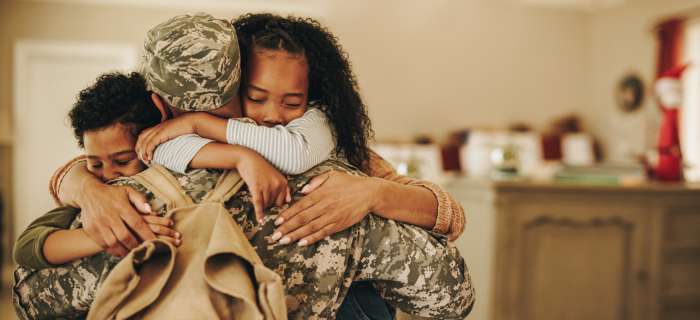There are many advantages to raising children while in the military. Military kids are overall well-taken care of. They have access to a good education and healthcare. Their parents bring home a good income and can provide for their needs without worry.
Military life may help bring up kids who are independent, resourceful, and resilient. Kids from the military community understand the value of service and may be inspired to serve themselves.
Children with parents in the military are also well-traveled and may have experience with different cultures. That being said, there are certainly some unique challenges to be aware of if you are a service member with a growing family.
Related: How to Talk with Kids About War: Pointers for Parents
In this article, we will discuss the ways that kids might be negatively affected by growing up in a military family and how parents can use a positive approach to discipline while navigating deployments and other aspects of military life.
How Does a Parent in the Military Affect a Child?
Having a parent in the military may have a significant impact on a young child, particularly during wartime. Deployment can be hard on kids because they miss their mom or dad, and often because the other parent may be under more pressure at home.
Why Children Push Your Buttons
Why Children Push Your ButtonsIt's 10:10 and thirteen-year-old Megan is still on the telephone. The rule is, there will be no telephone conversations after ten o'clock. Mother sticks her head into Megan's room and politely reminds her that she needs to finish the conversation and hang up. Megan nods and makes a face. At 10:20, Mother calmly reminds her again. Read More
Frequent moves required by military families can make it hard for the kids to develop a group of friends or a sense of belonging in each community.
If a family member heads into active combat or is deployed to a war zone, the stress in the child’s life increases exponentially. Fear and anxiety about a parent being injured or killed can have a major impact on a child’s mental well-being.
Kids growing up in a military family may experience:
- angry outbursts
- anxiety
- declining school performance
- defiant behavior
- depression
- separation anxiety
Long or frequent deployments or a parent in a war zone have the greatest effects on kids.
What Is Military Family Syndrome?
Military Family Syndrome is a term that refers to the effects that military life has on military families, specifically children and their parents. It was coined during the Vietnam War when large numbers of military children were noted to exhibit the same types of mental health behaviors and challenges.
These challenges showed up most often if a parent returned from deployment in a war zone with Post Traumatic Stress Disorder (PTSD) or a traumatic brain injury.
Some effects of Military Family Syndrome are:
- Complaining of aches and pains
- Extreme anxiety
- Depression
- Difficulty sleeping
- Kids may blame themselves for their parent’s changed and confusing behavior
- Separation anxiety during deployment after the parent’s return
What Is Positive Parenting?

Positive parenting provides a consistent family life environment with clear expectations and it enforces these expectations in a kind way. Expectations are realistic and reasonable and are created with a solid knowledge of child development in mind.
Kids know that their parents are there to help them and discipline is understood as a method of teaching kids correct behaviors, rather than pushing them for unwanted behaviors.
Using positive parenting skills can also help parents, whether military members or military spouses at home with the kids feel more confident when they face parenting challenges.
Positive Parenting for Military Families
There are many philosophies on child-rearing.
Sometimes military parents take a stricter, more authoritarian parenting approach to discipline, often inspired by their own experience on duty.
Consistency and high standards of behavior are certainly good things when it comes to parenting. However, it’s important to distinguish between an authoritative style, where caregivers are firm, fair, and kind, and an authoritarian style, where caregivers are inflexible and use harsh punishments.
Adopting a positive parenting style may be the perfect fit for military families. Since their children are often at a higher risk for mental health struggles, it’s even more important to ensure that the parent-child relationship is strong and healthy. Healthy relationships are the key to family resilience, even in the face of significant challenges such as those that may come with military life.
The 3 F's of Positive Parenting
It can be overwhelming to try to learn and adopt new parenting practices, especially since the job of parenting never ends. There are some quick reminders that can help keep things simple. One such reminder is called the 3 Fs. In almost any parenting interaction, you can call the 3 F’s to mind to check whether you are using positive parenting.
Here are the 3 F’s: Positive parenting should be firm, fair, and friendly.
Let’s break that down a bit further:
1. F is for Firm
Your standards for behavior are high and you mean what you say. Consistency helps reduce anxiety in children, and they test limits to see if adults will indeed hold them and keep them safe.
Example of “Firm” in Positive Parenting
You have told your children that anyone who has dressed themselves and placed their dishes in the sink may go play outside. Two of your kids have followed the directions and are playing outside. The third is dressed, but he has left his breakfast plate on the kitchen table.
Though it may be tempting to let it go, because it’s only a small task, a firm parent calls him back in to take the plate in. He needs to know that you mean what you say, or he’ll never be sure if your instructions are instructions or simply suggestions.
-
F is for Fair
Consequences are reasonable and related to any specific misbehavior. You are flexible and look at each situation individually.

Example of “Fair in Positive Parenting
Your child colored on the wall with crayons. The consequence should be that she cleans the crayons off the wall or that she at least helps in the process (hint: grab a Mr. Clean magic eraser when this happens!). You might also remove the crayons from a place she can reach for a temporary amount of time.
What you would not do is yell at your child or throw away all their crayons. Those responses are not reasonable. You also wouldn’t do anything extreme like causing them to miss an upcoming birthday party. A fair consequence is related to what the child did wrong and it helps them learn what to do right.
Fair can also mean flexible. Take the following examples:
- Your child is sick so you let them skip their chores
- You can tell your kid had a rough day at school so you let them choose any snack in the pantry, instead of enforcing your healthy snacks rule.
- Your child cannot complete all their homework, though you can tell they are trying their best. You go ahead and put them to bed and try to finish some in the morning, or let their teacher know why it isn’t done.
In these scenarios, it’s good to tell your child something like, “Today you can skip your chores because you’re not feeling well. I’ll do them today. Don’t worry. But once you feel better, your chores are yours again.”
-
F is for Friendly
Firm does not mean that you have to be mean. You should never use harsh punishments or attempt to blame or shame your child while disciplining them. While remaining consistent, speak kindly and with empathy.
Example of “Friendly” in Positive Parenting
Let’s go back to the crayon example first. When you first discover your child’s new “decorations” on your wall, you will most likely feel very upset. That’s OK, but now’s the time to take a deep breath and remember that in the grand scheme of things, it’s really not the end of the world. The important thing here is how you approach your child because that will have a lasting impact.
While you definitely don’t have to smile about the mess your kid made, you don’t need to show them all your negative emotions either. Take a moment to process and approach your kid once you’re in control of yourself.
Say something like, “Look, buddy, I see there are crayon drawings on our kitchen wall. The kitchen wall needs to be cleaned. Let me show you how to do it.” Notice that you don’t have to tell them that you are mad or use any negative language. If you focus on teaching them how to do the right thing, friendly language comes easier.
Positive Parenting Tips for Teens in Military Families
The same rules apply to disciplining teens as well. Keep things positive and focus on what you want them to learn. If they got a big dent in the side of the car, you can have them work back the money you need to fix it.
Remain calm and kind while you speak to them honestly. You might say something like, “I’m pretty bummed about that dent. It’s going to cost a lot of money. What are your plans for making that money? Would you like some ideas?”
It’s totally reasonable to add, “I’m not going to be able to let you drive the car for a while. I know that might be tough but I need to be sure you’ll be more careful before I’m comfortable allowing you behind the wheel again.” Or maybe you feel it was an honest mistake and you do think they’ll be fine continuing to drive. The important thing is a calm and respectful demeanor when you discuss it.
Positive parenting is beneficial for all families. But it can be especially helpful for families where kids may be more vulnerable to issues like anxiety and depression, such as military families. At the end of the day, your relationship with your child matters the most.


